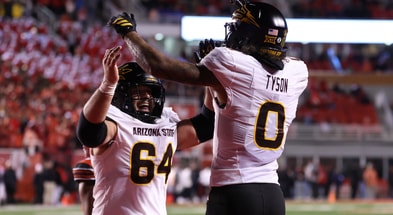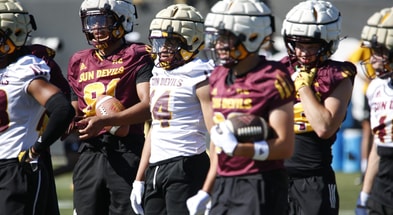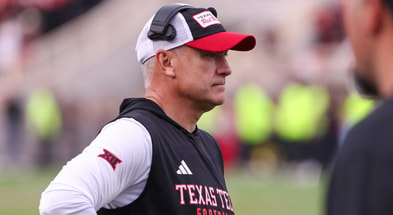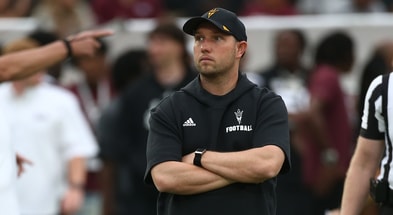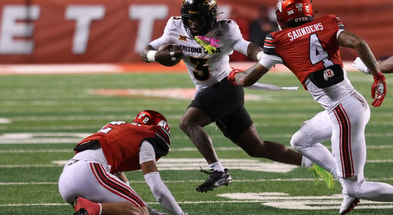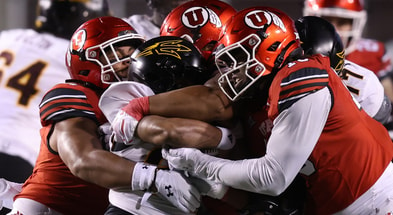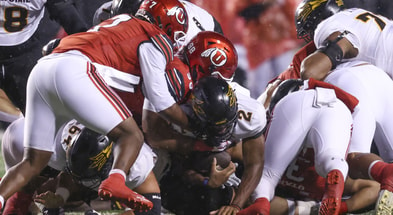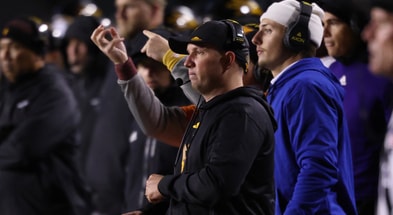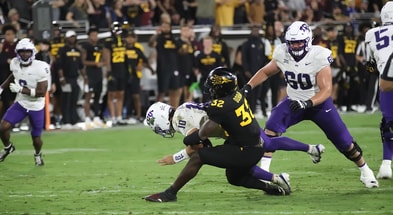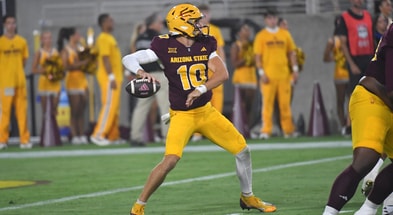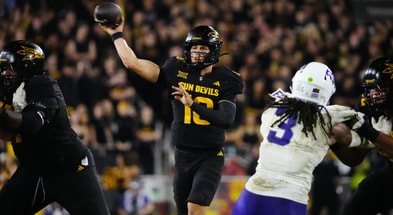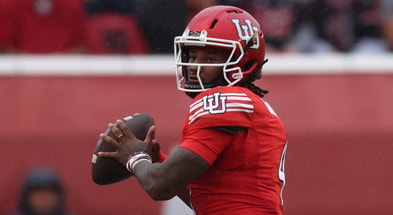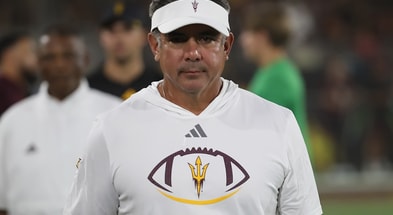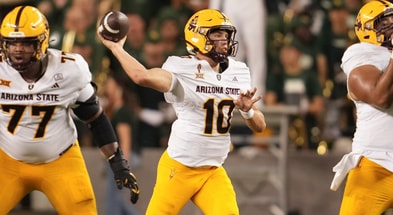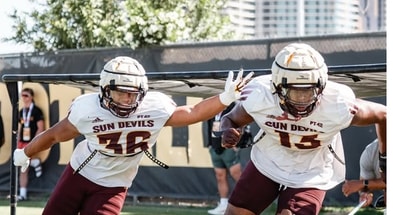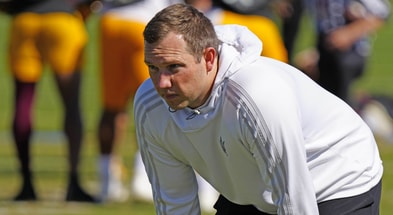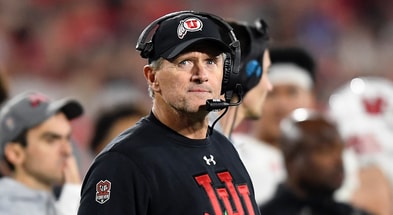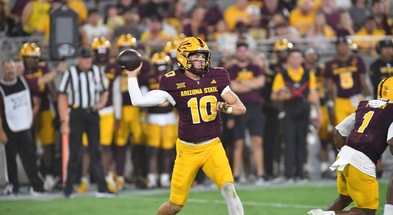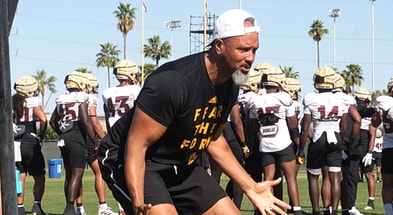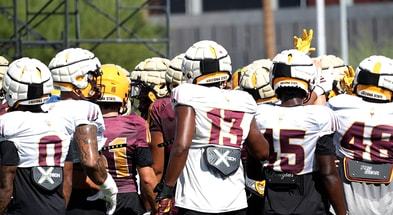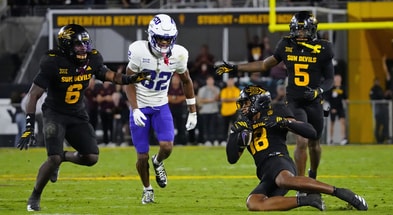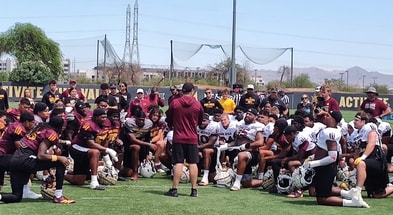Ward calls for defensive reset as ASU looks to regain its edge
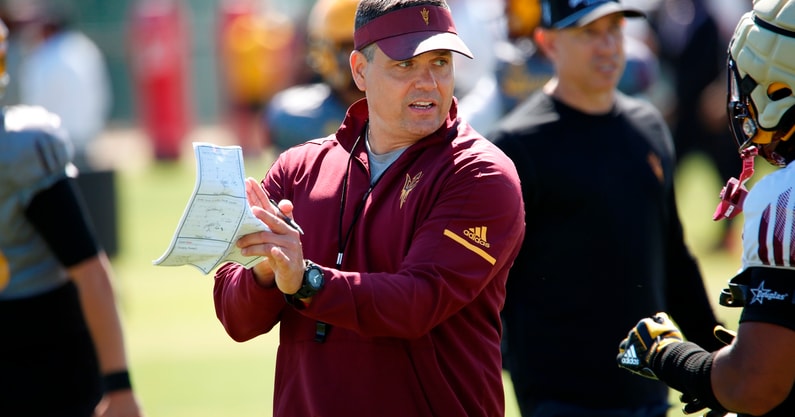

After a humbling trip to Salt Lake City, defensive coordinator Brian Ward didn’t shy away from the reality of Arizona State’s defensive struggles. The Sun Devils’ 42–10 loss to Utah wasn’t just a bad night at the office. It was, as Ward described, a reminder of how thin the margin is when discipline slips. This week, his focus is on a complete reset.
“Coming off the game you guys had last week against Utah, there’s never a break with any of these offenses that we’re playing,” Ward noted. “Utah was obviously very unique and brought their own set of problems that we didn’t handle very well, but Texas Tech is loaded everywhere. They got guys who could play on Sunday everywhere on offense. We’ve got our hands full, but we’ve got the group that can play with anybody. We’ve got to continue to give our guys confidence and emphasize the things that have gotten us to this point, to be successful and win games, and to feel like we can win every game we go into.”
For Ward, this week isn’t about reinventing Arizona State’s defense; it’s about recalibrating it. Tuesday’s practice carried noticeably more fire than usual, with coaches like Ward setting the tone. Tackling fundamentals, tempo adjustments, and mental preparation have all been points of emphasis throughout the session.
“It’s something that hasn’t really shown itself in the last year and a half,” Ward explained. “The first seven or eight games of 2023, we were solid. It presented different challenges, getting the speed of the offense and simulating it. We just didn’t do a good job, and that’s on me for not preparing our guys the right way. Some of the looks we gave weren’t at the speed or tempo they were running. As coaches, we have to have a microscope on that. We can’t let it slide at all.”
The challenge ahead doesn’t get any easier. No.7 Texas Tech brings a versatile, fast-paced offense that averages 47.5 points and 558.2 yards, capable of shifting gears with two talented quarterbacks: redshirt freshman Will Hammond and senior Behren Morton.
“It’s about understanding the offensive coordinator’s philosophy with certain personnel and molding what we do system-wise to what they’re doing,” Ward stated. “It’s all about strengths and weaknesses, taking away their strengths, making their weaknesses work for us. Both quarterbacks are incredibly talented. The younger kid has shown he can play at a high level against good competition, and Behren’s been there, done that, and is an NFL guy. You can see the progression Mack has made with him. He’s playing with a lot more confidence and moxie, and Mac is a hell of a coach. I knew he was a rising star, and he’s got that offense really clicking.”
Ward credited his veteran defenders for responding with urgency after the loss, relying on their leadership to refocus on detail and accountability.
“We have a group that really looks inside and at themselves. These are older guys who’ve had success against some of the best competition in the country. Utah did a great job, and we’ve got to take responsibility for it as coaches and as players. The conversations, the relationships, the weekly routines, those are what make a good coach and a good program. We have to own it and make sure it doesn’t happen again, so we can continue to improve.”
There’s also a personal subplot this week for Ward, who’ll face off again with Texas Tech offensive coordinator Mack Leftwich after last year’s chess match between their units when Leftwich was the offensive coordinator for Texas State, whom ASU faced in 2024.
“Matt’s part of that Air Raid family,” Ward noted. “He’s got answers for everything, humble, hardworking. We’ve studied each other before, and it’s going to be a heavyweight matchup. I look forward to seeing him after the game.”
***
Junior cornerback Javan Robinson is not one to sugarcoat things. After a 42-10 loss to Utah in which the Utes only threw 12 passes and ran for 276 yards, Robinson knew that getting upset wouldn’t help either. He decided to instead focus on what comes next: regaining physicality, working on tackling, and how to come back.
“This week we didn’t play our best last week,” Robinson noted. “Coming into this week and knowing the opponent we have, knowing the standard we need to play at, and knowing what the coaches expect of us, we’ve got to bring that every day in order to win this game.”
Tackling was a key topic throughout practice, as the team periods featured live tackling for the first time this season. Arizona State’s defense has prided itself on discipline, but it slipped against Utah’s run-oriented attack.
“Of course, tackling is important,” Robinson stated. “We didn’t put great stuff on film last week, unfortunately. We know that’s something Texas Tech is going to look at and think they can take advantage of. So, we’ve made it an emphasis this week to make sure that’s not a problem for us.”
The Utes’ ground-dominant style left Arizona State’s corners largely out of the action, something Robinson admitted can be mentally challenging.
“It’s kind of frustrating knowing you’re out of the plays and not really a factor,” Robinson explained. “But you’ve just got to stay positive, do your job, and make sure you’re there for the team. Same thing could happen again this week, you never know.”
Even in a lopsided game that offered few chances for the defensive backs to make plays, Robinson said the group remained locked in and ready for their moment.
“It’s frustrating when you can’t really change the game or the momentum because they’re not throwing your way,” Robinson shared. “But at the same time, you stay consistent. You can’t get too relaxed because the next play could be a shot your way. So, you’ve got to stay locked in regardless.”
While some might have been surprised by the result given ASU’s strong defensive showings earlier in the season, Robinson said the weather played a major role in how the game unfolded.
“It wasn’t really a surprise,” Robinson noted. “We knew the weather was going to be a factor. It was raining, the field was slippery, and we knew they wouldn’t throw much. We knew it was going to come down to physicality and tackling, and we just didn’t execute.”
Still, he refused to use the conditions as an excuse.
“Yeah, the weather was a factor,” Robinson admitted. “But at the end of the day, it’s not an excuse because they had to play in the same conditions we did. They just beat us, so we’ve got to be better.”
Looking ahead to Texas Tech, the Big 12’s second-highest passing offense with 1,952 yards, Robinson expects a very different challenge, one that will test the secondary more directly.
“We’ve got to be more physical,” Robinson said. “Their best players are on the outside, so as a corner group, we’ve got to limit those guys. That’ll give us the best shot to win. We know what they want to do, and we’ve got to take their best players out of the game.”
After reviewing film and scouting the Red Raiders’ offense for strengths and weaknesses, Robinson praised the team’s offensive rhythm.
“They’ve got great chemistry,” he explained. “You can tell their receivers like playing with each other, and they’re a good group. They’re all pretty big, 6’3 or 6’4, so we’ve got to know what they want to do and take that away.”
And with a top-10 opponent coming to Tempe for a primetime matchup, Robinson knows what’s at stake.
“Every game’s big,” he said. “But this one’s marked for a lot of people. We know what kind of team they are and what they did in the portal. It’s a 1:00 primetime game, so we know the emphasis on this one, and we’re preparing the right way to be ready for it.”
Returning to Mountain America Stadium gives ASU a chance to reset in front of its home crowd, something Robinson doesn’t take for granted.
“Our home crowd is amazing,” he noted. “They bring the energy, and that’s a big factor for us. We’re going to need all of it this week to do what we want to do.”
***
After a humbling defeat to the Utes, in which Arizona State allowed 276 rushing yards to the highest graded offense in the country according to PFSN’s grading (87.0), the Sun Devils are putting aside that game to focus on what it means to compete in the Big 12. Defensive tackle Jacob Rich Kongaika, a senior who leads the charge in the interior section of the defensive line, was frank about what is/what has been learned from last week’s struggles, as well as what it means going forward.
Coming off the loss, the team’s first practice was noticeably more competitive and charged with energy. Kongaika described the intensity, explaining how the group was determined to respond.
“Yeah, today was a high intensity,” Kongaika admitted, “a lot of physicality. We try to make sure we harp on that physicality. And yeah, a lot of energy.”
The defensive line, which was largely overrun by Utah’s rushing attack, used that energy in Tuesday’s session to emphasize fundamentals and push each other in drills. Tackling was a major focal point, especially since the team struggled mightily with that last week against the Utes. Missed tackles were a large reason Utah signal-caller Devon Dampier rushed for 120 yards. Certainly, right now, it was not only due to his line blocking effectively, but he was able to slip through gaps all night long. Kongaika stressed the necessity that the ball carrier has to be tackled on each play, & that they have to finish.
“As a defense, it’s more important for us to make the tackles,” Kongaika explained, “and the second guy can come in and try to get the ball out at least.”
The coaching staff, including Ward, emphasized live tackling in practice to simulate game speed and prepare for upcoming matchups. Bringing an extra level of intensity that ASU hadn’t seen in previous weeks, the defensive line raised its sights and expectations after a rough weekend.
Despite being overpowered in the trenches last Saturday, the defensive tackle emphasized that one poor performance doesn’t define the team.
“That definitely isn’t us,” Kongaika stated. “That one game doesn’t make us who we are. This is a statement game about that. BWard wanted us just to get more tackling in and being able to get some live tackling (in practice), so we’re ready for this next”
Looking ahead to Texas Tech, a team that rushed for 372 yards and four touchdowns in their own ground game explosion against Kansas this past Saturday, Kongaika emphasized the importance of brawn and overall preparation as key to slowing down their strong running attack.
“Just being more physical,” Kongaika remarked, “being the most physical group on the field, and just punching people in the mouth.”
He acknowledged the challenge the Red Raiders’ offensive line presents, but stressed the importance of effort.
“I mean, they work really well together, the whole line, and props to them on that, but you’ve got to work hard.”
Kongaika also spoke on his personal approach to rebounding from last week’s loss, highlighting leadership and accountability. Tackling drills are not just practice for him—they are a point of pride.
“I just make sure I bring more energy,” he explained, “be more physical, just try to be the most physical guy on the field. And just keep picking up my teammates and lifting them up. I love tackling whenever we get a chance. I love to hit someone.”
For the defensive line, the message is clear: intensity, discipline, and physicality must define the team’s identity moving forward.
“We still got a lot of confidence,” Kongaika claimed. “I felt like we weren’t just worrying ourselves, we just got to play better this time, come ready for the game this time. We just have to come out physically. We got to come and just be ourselves and play our game. No matter what the weather conditions are or anything.”

